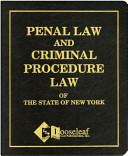This contemporary, comprehensive, case-driven book from award-winning teacher Matthew Lippman covers the constitutional foundation of criminal procedure and includes numerous cases selected for their appeal to today’s students. Organized around the challenge of striking a balance between rights and liberties, Criminal Procedure, Fourth Edition emphasizes diversity and its impact on how laws are enforced. Built-in learning aids, including You Decide scenarios, Legal Equations, and Criminal Procedure in the News features, engage students and help them master key concepts. Fully updated throughout, the Fourth Edition includes today’s most recent legal developments and decisions. Features and Benefits A chapter-opening vignette drawn from a case in the chapter gets students immediately involved in the content that follows. Test Your Knowledge questions at the beginning of each chapter help students activate prior knowledge read with purpose for topics they don't yet know. Edited cases introduced by clear and accessible descriptions provide students with concrete examples and illustrations and expose them to the actual documents that have shaped the American criminal justice system. Additional edited cases are available on the student study website. Legal Equations offer visual overviews of the laws and concepts discussed in the text. Questions after each case reinforce learning and help students uncover the key points. Criminal Procedure in the News excerpts expose students to contemporary developments in the law through current events. Chapter Summaries and Chapter Review Questions help students prepare for exams. A chapter-ending Legal Terminology section with corresponding Glossary helps students master the vocabulary of the criminal justice system. New to this Edition A number of significant, new U.S. Supreme Court decisions are now cases discussed in the book, such as United States v. Carpenter, which raised important questions around police use of new technology. Other new cases address important issues including privacy, racial discrimination, and effective assistance of counsel, search and seizure, juries, plea bargaining, the exclusionary rule, pretrial motions, and habeas corpus. Features. The content includes a new Test Your Knowledge feature and a number of new You Decide and Criminal Procedure in the News features that explore crucial topics such as police use of deadly force, the second amendment and gun control, a defendant’s right to a bail, racial bias in jury deliberations, searches of electronic devices, and much more. Topics. Several new topics have been added or expanded to reflect their growing impact on criminal procedure. These topics include technology and the home, police use of cell-site location information and body cameras, patterns and trends of Terry stops in major cities across the US, individuals being arrested for “Walking While Black,” racial bias in the judiciary, and the impact of the policies of the Trump administration on the use of drones, the detention of undocumented immigrants, and the continued operation of the detention facilities at Guantanamo.
New to this Edition A number of significant, new U.S. Supreme Court decisions are now cases discussed in the book, such as United States v. Carpenter, which raised important questions around police use of new technology.








